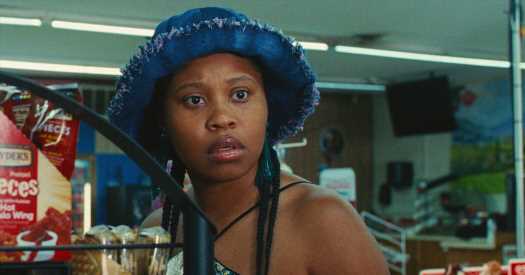
‘Swarm’ Review: The Underside of ‘Atlanta’
03/17/2023In a new series on Amazon Prime Video, Donald Glover shifts from comedy with touches of horror to horror with grace notes of comedy.
Send any friend a story
As a subscriber, you have 10 gift articles to give each month. Anyone can read what you share.
By Mike Hale
Fresh off the November finale of his singular comedy-not-comedy “Atlanta,” Donald Glover is back with “Swarm,” a creepy little mini-series (seven half-hour episodes premiered Friday on Amazon Prime Video) that tries to achieve some of that earlier show’s disorienting, disquieting effects in the context of horror. That “Swarm” is only intermittently successful doesn’t make it any easier to look away from the screen.
It’s not hard to understand why more and more filmmakers are choosing the horror genre for stories set in contemporary America, particularly those involving the lives of people outside the white-male protective bubble. “Swarm” is about a young Black woman, Dre (Dominique Fishback), who is obsessed with a Beyoncé-style pop star named Ni’Jah; when she encounters people who are not sufficiently reverential of her heroine, she dispenses swift, blunt justice via sledgehammer, kettlebell, cast-iron frying pan or whatever other heavy object is at hand. Her serial violence is the dark-comic foundation for the show’s satire of fan culture and social media, and its depiction of their effect on someone who has always felt like an outcast.
“Swarm” doesn’t really seem to be about fans or tweets, however, or for that matter about Beyoncé (although its correlation of Ni’Jah with Beyoncé, and its allusion to the BeyHive fan army, is startlingly on-the-nose). In the show’s best moments, the premise serves as an attention-grabbing, plot-propelling armature for a story that promises, for a while at least, to be more interesting than that.
Glover created “Swarm” with Janine Nabers, who was a writer and co-executive producer on “Atlanta”; other “Atlanta” alums, including Glover’s brother, the writer Stephen Glover, have moved to the new show as well. Donald Glover’s only hands-on credits are for story and directing on the first episode (written by Nabers), and it is the most “Atlanta”-like of the series, as well as the best. Along with the second episode (written by Jamal Olori and directed by Adamma Ebo), it has Glover’s trademark atmosphere — dense but woozy — and his signature style, a cheek-to-cheek dance with surrealism that implicitly denies the barrier between the uncanny and the ordinary in our current lives.
And these episodes’ introduction of Dre, an odd, childlike, barely employed young woman eking out an existence in Houston in 2016, has a visceral, emotional texture that pulls you in and makes you curious. (The show’s time frame, from 2016 to 2018, feels as if it were chosen simply to avoid dealing with the pandemic.) The action, which spirals out from a calamity involving Dre’s roommate and lifeline, Marissa (Chloe Bailey), suggests that the show is really about the things that Dre’s fandom is substituting for: self-respect, love, companionship, money.
The central metaphor, cleverly interwoven, is hunger. Dre’s reaction to a kill is to fling open the refrigerator and grab for food. A continuing motif finds Dre being asked if she’s hungry, and Fishback gives each quiet “yes” a hard punch of emotion. When Dre finally comes face-to-face with Ni’Jah, her reaction, in a figurative and quasi-literal sense, is to devour her.
“Swarm” doesn’t work through or make strong dramatic use of those ideas, though, and it ends in a formless, non-sequiturish, let’s-get-this-over-with manner. It feels as if no one really knew where they wanted to take things. In the balance of the season, the viscous, seductive ambience and dream-logic storytelling mostly fade out, replaced by high-concept, tonally garish episodes that hold your attention but stand alone like neon billboards, adding little to our understanding of Dre beyond the facts of her back story, doled out in typical streaming-series style.
One of these episodes finds Dre holed up with a cultlike group of blissed-out white women (their leader played by Billie Eilish) whose hospitality takes a “Midsommar”-style turn. (An additional motif of the show is the stream of people, usually white, who for their own reasons reach out to Dre offering a pretense of understanding or protection.) Another goes the full bottle-episode route, presenting an installment of a mock true-crime series, which can be taken as commentary on the way media culture exploits disturbed people’s distress but also serves to stitch up loose ends and lurch the plot ahead before the season finale.
Fishback, best known for playing a levelheaded prostitute turned porn star in the HBO series “The Deuce,” keeps our sympathies with Dre throughout the show’s ups and downs. In the early episodes, she gives Dre a timid, recessive quality, acting out of the corners of her eyes, but she also suggests a stubborn resolve that turns into confidence once Dre starts killing people. She uses her whole body to communicate Dre’s combination of tentativeness and strength, in the way she hesitates before kicking an abusive musclehead (symbolically felled with his own dumbbell) or the way she pulls herself through a window during a home invasion.
Despite the never-failing emotional presence Fishback provides, however, Dre remains a bit of a hollow shell — a vehicle for a grab bag of ideas about potent topics like female empowerment and identity, and the ways in which Black women are alternately condescended to and ignored, that are smartly annotated but don’t come together in a way that makes dramatic sense. And that keeps “Swarm” from being as anarchically funny or frightening as it promises to be. You can come for the horror-comedy, but you’ll have to decide whether to stay for the lecture.
Site Index
Site Information Navigation
Source: Read Full Article



